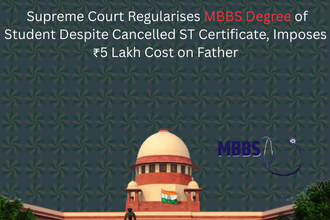No Direct Instigation or Close Proximity Between Alleged Harassment and Suicide, Rules Supreme Court
The Supreme Court of India has upheld the Karnataka High Court’s decision to quash an abetment to suicide case against the business partner of a deceased man, ruling that there was no direct instigation leading to the suicide. However, the Court partially allowed the appeal by reviving the cheating charges under Section 420 IPC, holding that a posthumous fraud case is maintainable if cheating is established.
Background of the Case
A bench comprising Justices BR Gavai and AG Masih heard a special leave petition filed by the widow of the deceased challenging the High Court’s order quashing an FIR registered against Respondents 2 to 4 (accused) under Sections 306 (abetment to suicide), 420 (cheating), and 506 (criminal intimidation) read with Section 34 (common intention) of the IPC.
The deceased was a partner in M/s. Soundarya Constructions alongside Respondents 2 and 3. On April 14, 2024, he was found hanging, and the police initially ruled it as a suicide.
On May 18, 2024, the appellant (his widow) claimed to have discovered a suicide note in his handwriting, where he accused Respondents 2 to 4 of cheating and blackmailing him, which allegedly drove him to take his own life.
Following this, an FIR was registered on May 22, 2024. However, the Karnataka High Court quashed the FIR, ruling that the allegations did not establish abetment to suicide under Section 306 IPC due to a lack of direct instigation. Additionally, it found no case of cheating under Section 420 IPC, reasoning that the deceased could have complained during his lifetime if fraud had occurred.
Aggrieved by this decision, the appellant-wife approached the Supreme Court.
Read Also: CBI Court Acquits Former High Court Judge Nirmal Yadav in ₹15 Lakh Cash Case
Supreme Court’s Observations
1. Abetment to Suicide Charge (Section 306 IPC) Quashed
The Supreme Court upheld the High Court’s decision to quash the abetment to suicide charge, ruling that there was no proximity between the alleged harassment and the suicide.
The Court noted that the deceased died by suicide on April 14, 2024, whereas the alleged harassment took place 39 days earlier, breaking the legal requirement for proximity between the act of instigation and the commission of suicide.
Reliance was placed on Prakash v. State of Maharashtra, 2024 SCC OnLine SC 3835, where the Supreme Court held that a one-month gap between alleged instigation and suicide was insufficient to establish abetment.
“Even taking the allegations at face value, it cannot be said that the allegations amount to instigating the deceased to commit suicide. In any case, there is no reasonable nexus between the period to which the allegations pertain and the date of death,” the Court stated.
The Court also found that the FIR was registered only after the suicide note was allegedly discovered—suggesting that the decision to register the FIR was an afterthought.
“The entire FIR appears to be an afterthought since the complaint was registered much after the alleged suicide. This further weakens the case under Section 306 IPC,” the Court noted.
2. Cheating Charge (Section 420 IPC) Revived
However, the Supreme Court disagreed with the High Court’s decision to quash the FIR under Section 420 IPC. It ruled that the deceased’s inability to complain during his lifetime does not bar a posthumous case if fraud is established.
“The learned Single Judge of the High Court, in our view, while quashing the proceedings under Section 420 IPC, has acted in a casual and cursory manner. If the High Court found that the investigation papers did not constitute an offence, it should have provided reasons for its conclusion,” the Court observed.
The Court criticized the High Court’s lack of reasoning and reinstated the cheating charges for further investigation.
“In the absence of any reasons given, we are of the considered view that the learned Single Judge of the High Court has erred in quashing the proceedings under Section 420 IPC,” the Court ruled.
Conclusion
The Supreme Court partially allowed the appeal, affirming the quashing of the abetment to suicide charge (Section 306 IPC) but restoring the cheating charge (Section 420 IPC) for further investigation.
For Internship: VIDHI Litigation Internship by Think India
Case Title: R. Shashirekha v. State of Karnataka & Ors.
Appearances:
- For Petitioner(s):
- Sr. Adv. Shanthkumar V. Mahale
- Adv. Adviteeya
- Adv. Nishant
- AOR Madhvendra Singh
- For Respondent(s):
- Sr. Adv. D.L. Chidananda
- Sr. Adv. Dama Sheshadri Naidu
- Adv. C.B. Gururaj
- Adv. Sai Shakti
- Adv. Animesh Dubey
- M/S. Gururaj & Nayak, AOR


